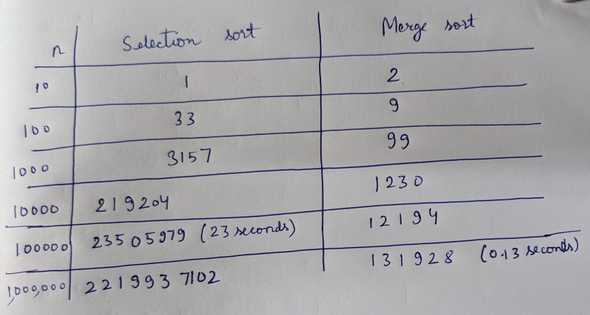« Experimental analysis for time taken by algorithm
What is time complexity analysis
Idea is to figure out how good or bad the solution is in terms of time & space required. In general we try to find worst cases as we want to be sure our algorithm performs well in worst cases also.
Cons of experiment analysis:
If we run our program again it will give different result
Reason: when we run our program it is not the only program that runs. How much time processor will give to my program and other similar reasons will tell us how much time our program will take on the exact same input.Test case generation. Reason:
11 2 3 4 523Insertion sort: very fast45Selection sort: slow67Insertion sort and selection sort are almost same time complexity algorithm but some test cases favour particular algorithms.If a problem comes and I figured out 10 solutions. How will I figure out which is better. I have to write code for each of them.
Time consuming. Selection sort might take minutes and hours to sort 10 million integers.
Time taken by Merge sort for sorting certain size array
1#include <iostream>2#include <iomanip>3#include <algorithm>4#include <string>5#include <cstring>6#include <vector>7#include <cmath>8#include <map>9#include <climits>10#include <sys/time.h>11// climits for INT_MIN12#include <unordered_map>13using namespace std;1415long timeInMicroseconds()16{17 struct timeval start;18 gettimeofday(&start, NULL);19 return (start.tv_sec * 1000000 + start.tv_usec);20}2122void merge(int arr[], int start, int mid, int end)23{24 int n1 = mid - start + 1;25 int n2 = end - mid;2627 int L[n1], R[n2];2829 for (int i = 0; i < n1; i++)30 {31 L[i] = arr[start + i];32 }33 for (int j = 0; j < n2; j++)34 {35 R[j] = arr[mid + 1 + j];36 }3738 int i = 0;39 int j = 0;40 int k = start;4142 while (i < n1 && j < n2)43 {44 if (L[i] <= R[j])45 {46 arr[k] = L[i];47 i++;48 }49 else50 {51 arr[k] = R[j];52 j++;53 }54 k++;55 }5657 while (i < n1)58 {59 arr[k] = L[i];60 i++;61 k++;62 }6364 while (j < n2)65 {66 arr[k] = R[j];67 j++;68 k++;69 }70}7172void mergeSort(int *arr, int start, int end)73{74 if (start >= end)75 {76 return;77 }78 int mid = (start + end) / 2;79 mergeSort(arr, start, mid);80 mergeSort(arr, mid + 1, end);81 merge(arr, start, mid, end);82}8384int main()85{86 for (int n = 10; n <= 1000000; n *= 10)87 {88 int *arr = new int[n];89 long startTime, endTime;90 for (int i = 0; i < n; i++)91 {92 arr[i] = n - i;93 }94 startTime = timeInMicroseconds();95 mergeSort(arr, 0, n - 1);96 endTime = timeInMicroseconds();97 cout << "Merge sort for n = " << n << " size time= " << (endTime - startTime) << endl;98 }99 return 0;100}
Time taken by Selection sort for sorting certain size array
1#include <iostream>2#include <iomanip>3#include <algorithm>4#include <string>5#include <cstring>6#include <vector>7#include <cmath>8#include <map>9#include <climits>10#include <sys/time.h>11// climits for INT_MIN12#include <unordered_map>13using namespace std;1415long timeInMicroseconds()16{17 struct timeval start;18 gettimeofday(&start, NULL);19 return (start.tv_sec * 1000000 + start.tv_usec);20}2122void selectionSort(int arr[], int n)23{24 for (int j = 0; j < n - 1; j++)25 {26 int min = arr[j];27 int pos = j;28 for (int i = j + 1; i < n; i++)29 {30 if (arr[i] < min)31 {32 min = arr[i];33 pos = i;34 }35 int temp = arr[j];36 arr[j] = min;37 arr[pos] = temp;38 }39 }40}4142int main()43{44 for (int n = 10; n <= 1000000; n *= 10)45 {46 int *arr = new int[n];47 long startTime, endTime;48 for (int i = 0; i < n; i++)49 {50 arr[i] = n - i;51 }52 startTime = timeInMicroseconds();53 selectionSort(arr, n);54 endTime = timeInMicroseconds();55 cout << "Merge sort for n = " << n << " size time= " << (endTime - startTime) << endl;56 }57 return 0;58}
